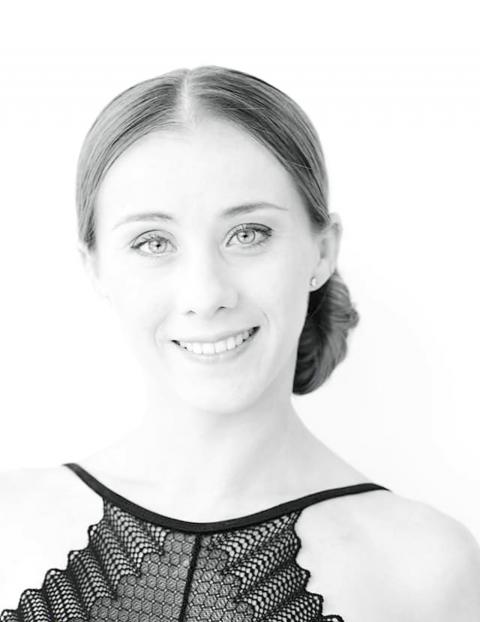Allen Yu (余能盛) loves the music of Peter Ilyich Tchaikovsky. His passion for the 19th-century Russian composer, who created the scores for some of the best-loved ballets in the Western classical canon, is not surprising for a ballet dancer or choreographer, but Yu could almost be considered somewhat obsessed.
Not only has he used Tchaikovsky’s music for several productions for his Formosa Ballet troupe (福爾摩沙芭蕾舞團) — its previous incarnation as the Chamber Ballet Taipei (台北室內芭蕾舞團) — but for works he created when he was deputy ballet director and choreographer at the Graz Opera House in Austria, many of the pieces he has produced in Taiwan have told about the composer’s life or his personal struggles, such as Romance — The Music and The Destiny of Tchaikovsky, Tchaikovsky — None But the Lonely Heart and When Ballet Meets Tchaikovsky.
After last year’s meditation on war, mankind and Mother Nature, Lost Illusion (失落的幻影), Yu has returned to his favorite subject with this year’s production, About Tchaikovsky (關於柴可夫斯基), which premieres in Tainan tomorrow night before starting a four-city tour.

Photo courtesy of Sandy Ouyang
He has also brought back two of his favorite guest artists, the Romanian couple Christina Dijmaru and Bogdan Canila, who are both principal dancers with the Bucharest National Opera Ballet.
Taiwanese Chiu Chu-en (邱主恩), who was so impressive in last year’s show is also back as a soloist, as is the Evergreen Symphony Orchestra (長榮交響樂團).
Yu centered this year’s production on two of Tchaikovsky works: the String Sextet in D minor, Op. 70, also known as Souvenir de Florence and Symphony No. 4 in F minor, Op. 36.
Yu said the first section of About Tchaikovsky is a love story, inspired by the composer’s love of Florence, the city where he not only worked on the string sextet, but where he composed the opera The Queen of Spades.
For this section, Yu based his storyline on Tchaikovsky’s 13-year relationship — by letters only — withy a wealthy widow, Nadezhda von Meck, who became his patron.
The second half of the show, set to the symphony, focuses on what Yu said was one of the unhappiest times in Tchaikovsky’s life following his disastrous and short-lived marriage to a former student, Antonina Miliukova.
However, for his the storyline Yu drew on another famous Russian, the poet and author Alexander Pushkin, who was a major influence on Tchaikovsky, and the convoluted love affairs and passions of Pushkin’s novel Eugene Onegin and his short story The Queen of Spades.
■ Tomorrow at 7:30pm, Sunday at 3pm at the Tainan Municipal Cultural Center Performance Hall (台南市立文化中心演藝廳), 332, Jhonghua E Rd Sec 3, Tainan (台南市中華東路三段332號)
■ Remaining tickets are NT$400 to NT$1,600; available online at www.artsticket.com, at convenience store ticket kiosks and at the door
■ Additional performances: Wednesday at 7:30pm at Kaohsiung Chihteh Hall (高雄至德堂), 67 Wufu 1st Rd, Kaohsiung (高雄市五福一路67號); Saturday at 7:30pm at Taichung Chungshan Hall (台中市中山堂), 98 Syueshih Rd, Taichung (台中市學士路98號); Aug. 21 at 7:30pm at the Performance Hall of the Hsinchu County Cultural Affairs Bureau (新竹縣文化局演藝廳), 146 Siancheng 9th Rd, Jhubei City, Hsinchu County (新竹縣竹北市縣政九路146號) and Aug. 23 and 24 at 7:30pm, Aug. 25 at 3pm at the Taiwan Traditional Theatre Center (臺灣戲曲中心小表演廳), 51 Wenlin Rd (台北士林區文林路751號).
■ The Kaohsiung show is sold out. The only seats left for the Taichung show are NT$400, for Hsinchu and Taipei shows, the tickets range from NT$400 to NT$2,000; available online at www.artsticket.com and at convenience store ticket kiosks

As Taiwan’s second most populous city, Taichung looms large in the electoral map. Taiwanese political commentators describe it — along with neighboring Changhua County — as Taiwan’s “swing states” (搖擺州), which is a curious direct borrowing from American election terminology. In the early post-Martial Law era, Taichung was referred to as a “desert of democracy” because while the Democratic Progressive Party (DPP) was winning elections in the north and south, Taichung remained staunchly loyal to the Chinese Nationalist Party (KMT). That changed over time, but in both Changhua and Taichung, the DPP still suffers from a “one-term curse,” with the

Jan. 26 to Feb. 1 Nearly 90 years after it was last recorded, the Basay language was taught in a classroom for the first time in September last year. Over the following three months, students learned its sounds along with the customs and folktales of the Ketagalan people, who once spoke it across northern Taiwan. Although each Ketagalan settlement had its own language, Basay functioned as a common trade language. By the late 19th century, it had largely fallen out of daily use as speakers shifted to Hoklo (commonly known as Taiwanese), surviving only in fragments remembered by the elderly. In

William Liu (劉家君) moved to Kaohsiung from Nantou to live with his boyfriend Reg Hong (洪嘉佑). “In Nantou, people do not support gay rights at all and never even talk about it. Living here made me optimistic and made me realize how much I can express myself,” Liu tells the Taipei Times. Hong and his friend Cony Hsieh (謝昀希) are both active in several LGBT groups and organizations in Kaohsiung. They were among the people behind the city’s 16th Pride event in November last year, which gathered over 35,000 people. Along with others, they clearly see Kaohsiung as the nexus of LGBT rights.

In the American west, “it is said, water flows upwards towards money,” wrote Marc Reisner in one of the most compelling books on public policy ever written, Cadillac Desert. As Americans failed to overcome the West’s water scarcity with hard work and private capital, the Federal government came to the rescue. As Reisner describes: “the American West quietly became the first and most durable example of the modern welfare state.” In Taiwan, the money toward which water flows upwards is the high tech industry, particularly the chip powerhouse Taiwan Semiconductor Manufacturing Co (TSMC, 台積電). Typically articles on TSMC’s water demand